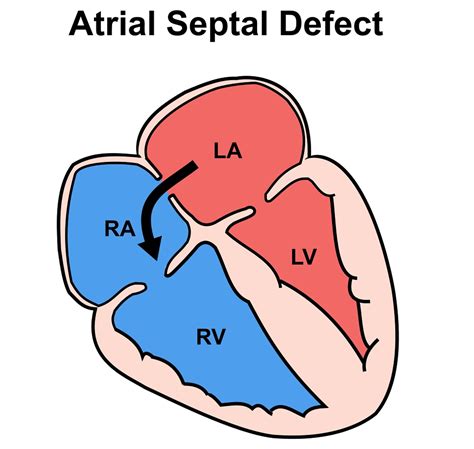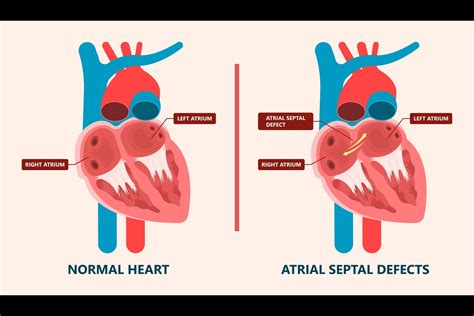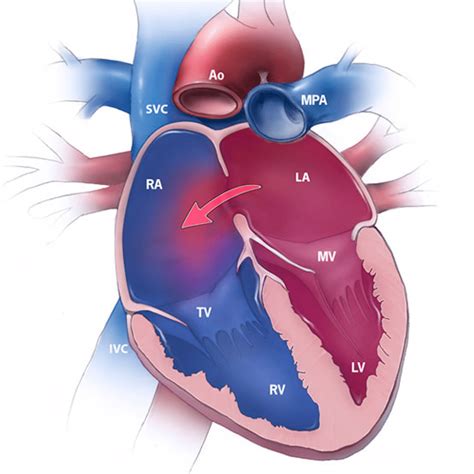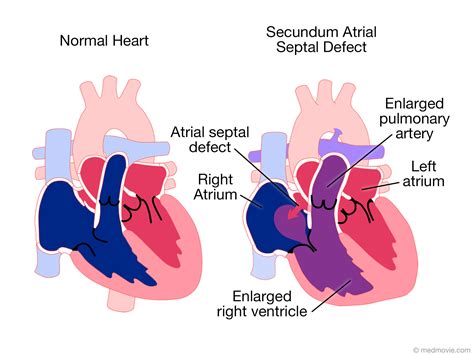Intro
Discover 5 crucial ASD heart defect facts, including atrial septal defect symptoms, diagnosis, and treatment options, to understand this congenital heart condition.
The heart is a vital organ that plays a crucial role in maintaining the overall health and well-being of an individual. However, some people are born with heart defects, which can affect the proper functioning of the heart. One such condition is the Atrial Septal Defect (ASD), also known as a hole in the heart. In this article, we will delve into the world of ASD heart defects, exploring their causes, symptoms, diagnosis, treatment options, and more.
Atrial Septal Defect (ASD) is a type of congenital heart defect that occurs when there is an abnormal opening in the dividing wall between the upper chambers of the heart, known as the atria. This opening allows blood to flow between the left and right atria, which can lead to various health problems. ASD heart defects can be present at birth or develop later in life due to certain medical conditions or injuries. Understanding the facts about ASD heart defects is essential for individuals who are affected by this condition, as well as their families and caregivers.
ASD heart defects can have a significant impact on an individual's quality of life, and it is essential to seek medical attention if symptoms persist. The good news is that with proper diagnosis and treatment, individuals with ASD heart defects can lead active and healthy lives. In the following sections, we will explore the causes, symptoms, diagnosis, and treatment options for ASD heart defects in more detail.
Atrial Septal Defect Causes and Risk Factors

Types of Atrial Septal Defects
There are several types of ASD heart defects, including: * Ostium secundum ASD: This is the most common type of ASD, which occurs when there is a hole in the middle part of the atrial septum. * Ostium primum ASD: This type of ASD occurs when there is a hole in the lower part of the atrial septum. * Sinus venosus ASD: This type of ASD occurs when there is a hole in the upper part of the atrial septum. * Coronary sinus ASD: This type of ASD occurs when there is a hole in the coronary sinus, which is a small venous structure that drains blood from the heart.Atrial Septal Defect Symptoms and Diagnosis

Diagnosing ASD heart defects typically involves a combination of physical examination, medical history, and diagnostic tests, such as:
- Electrocardiogram (ECG or EKG)
- Chest X-ray
- Echocardiogram (echo)
- Cardiac catheterization
- Magnetic resonance imaging (MRI)
Atrial Septal Defect Treatment Options
Treatment for ASD heart defects depends on the size and location of the defect, as well as the individual's overall health. In some cases, ASD may not require treatment, especially if the defect is small and not causing any symptoms. However, in more severe cases, treatment may be necessary to prevent complications and improve quality of life. Treatment options for ASD include: * Medications to manage symptoms and prevent complications * Catheter-based procedures to close the defect * Surgical repair to close the defect * Lifestyle modifications, such as avoiding strenuous exercise and managing stressAtrial Septal Defect Complications and Prevention

Preventing complications and improving quality of life requires regular medical follow-up, adherence to treatment plans, and lifestyle modifications. Individuals with ASD heart defects should:
- Avoid strenuous exercise and physical activity
- Manage stress and anxiety
- Get regular check-ups with their healthcare provider
- Follow a healthy diet and maintain a healthy weight
- Avoid smoking and secondhand smoke
Atrial Septal Defect Prognosis and Outlook
The prognosis and outlook for individuals with ASD heart defects vary depending on the size and location of the defect, as well as the effectiveness of treatment. With proper diagnosis and treatment, most individuals with ASD can lead active and healthy lives. However, it is essential to work closely with a healthcare provider to manage symptoms, prevent complications, and improve quality of life.Atrial Septal Defect FAQs and Resources

What is an Atrial Septal Defect (ASD)?
+An Atrial Septal Defect (ASD) is a type of congenital heart defect that occurs when there is an abnormal opening in the dividing wall between the upper chambers of the heart.
What are the symptoms of ASD?
+The symptoms of ASD can vary depending on the size and location of the defect, but common symptoms include shortness of breath, fatigue, palpitations, and swelling in the legs, ankles, or feet.
How is ASD diagnosed?
+Diagnosing ASD typically involves a combination of physical examination, medical history, and diagnostic tests, such as electrocardiogram (ECG or EKG), chest X-ray, echocardiogram (echo), and cardiac catheterization.
In conclusion, Atrial Septal Defect (ASD) is a type of congenital heart defect that can have a significant impact on an individual's quality of life. Understanding the causes, symptoms, diagnosis, treatment options, and complications of ASD is essential for individuals and families affected by this condition. By working closely with a healthcare provider and following a healthy lifestyle, individuals with ASD can lead active and healthy lives. We invite you to share your experiences and ask questions in the comments below, and we encourage you to share this article with others who may be affected by ASD heart defects.
